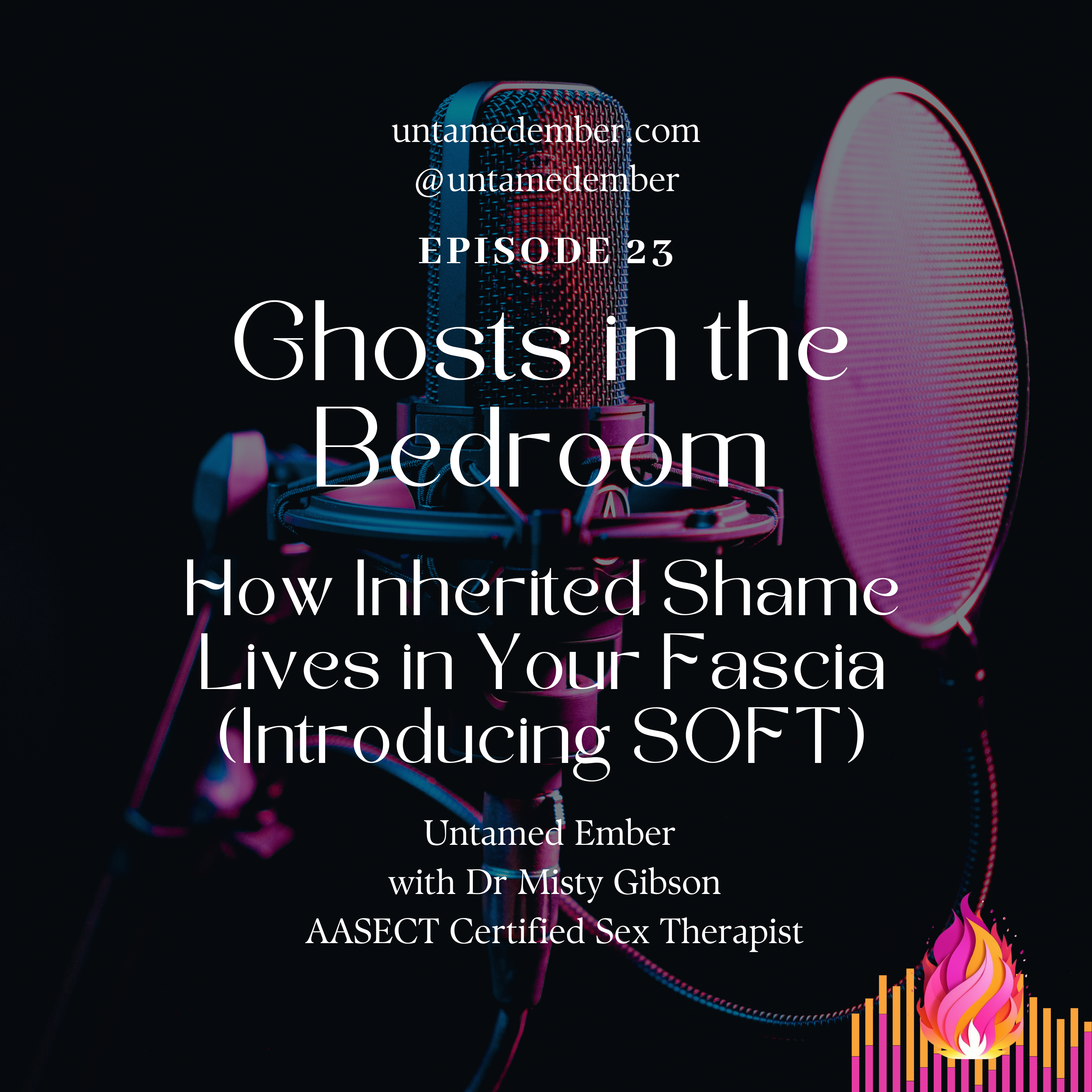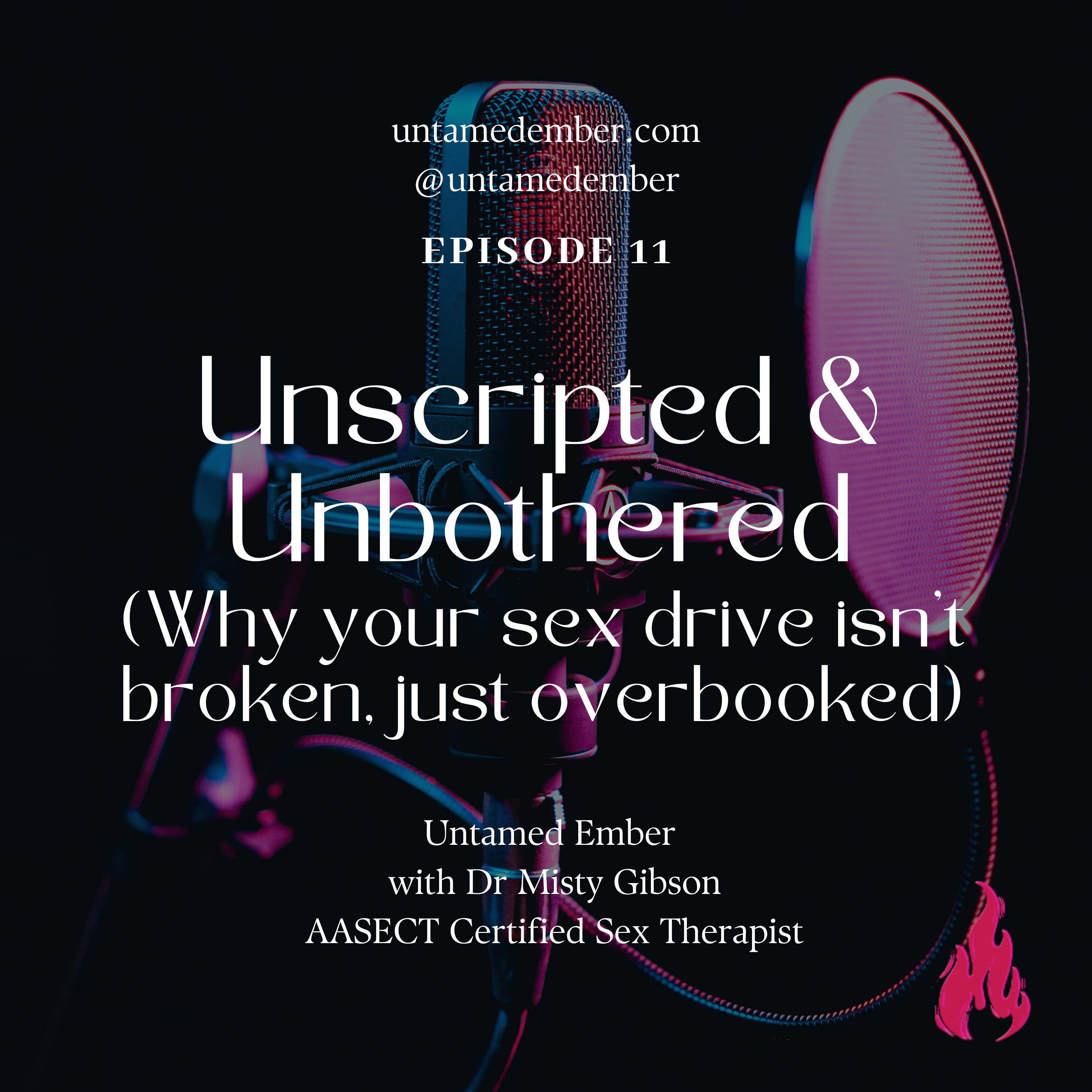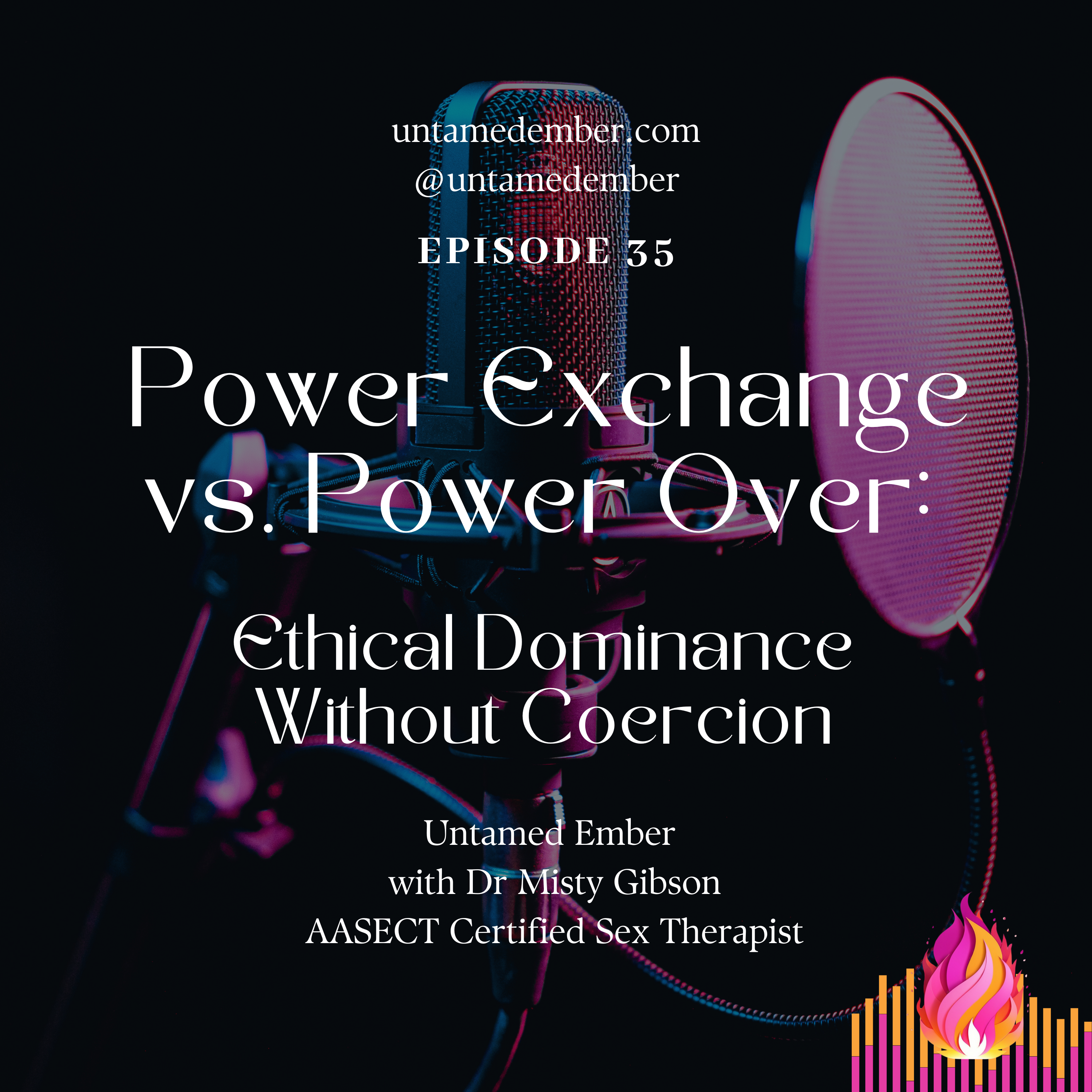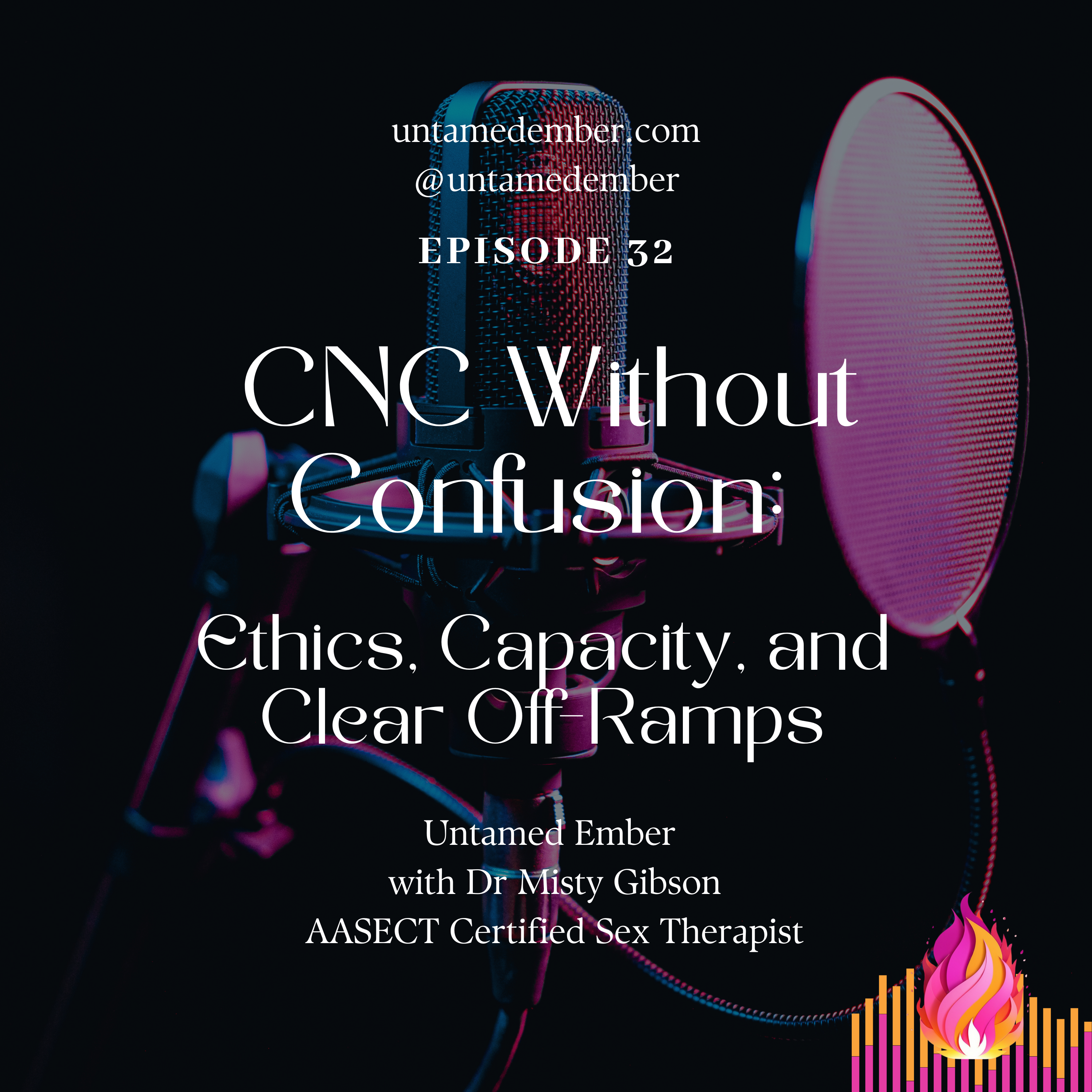Episode Transcript
[00:00:00] Hey rebels and reclamation warriors, welcome back to untamed ember. I'm Dr. Misty, and around here we do things differently. This isn't the podcast for perfectly packaged advice, for just think positive pep talks, or for pretending that sex and healing look the same for everyone.
[00:00:19] This is where we smash shame, get radically honest, and start telling the truth Our bodies have been holding for way too long.
[00:00:28] Today we're going deeper into a question I hear all the time. Why do I keep shutting down during sex, even when I want to be present? Or maybe you recognize this one.
[00:00:40] Why does my body tense up, freeze, or just check out, especially in the moments I'm hoping to feel the most? And let's be real. If you've ever felt like your body is haunted by old stories, shutdowns, or rules you never chose, you are in exactly the right place. I'm calling this episode Ghosts in the Bedroom because so many of us are living with the echoes of stuff that didn't start with us. And today we're going to start naming those ghosts, finding where they live in the body, and learning how to reclaim our space. One breath, one act of curiosity, one small move toward pleasure at a time. We're also doing something a little special for for the first time on Untamed Ember, I'll be sharing my soft approach, Somatic Oriented fascia therapy, which grew out of years of working with folks whose bodies were still bracing for shame even after all the healing work.
[00:01:37] If you've ever felt like you just can't think your way out of frieze, you're not alone. Today we're doing something different. Let's get started. Before we dive into fascia and soft, let's just take a minute to remember what I mean when I talk about ghosts in the bedroom. If you've been with me for a while, you've heard my deep dive on inherited shame. If you haven't, Quick summary. So much of what feels hard, scary, or even impossible about sex and intimacy didn't start with you. Most of us learned, directly or indirectly, rules about what's allowed, what's dangerous, and what's desirable. These rules get handed down. Family, religion, culture, the media.
[00:02:19] All those layers become scripts that your nervous system memorizes. Sometimes before you ever even have words for it. It might sound like sex is dirty unless you're married.
[00:02:30] Good girls don't want real men are always in the mood.
[00:02:35] Your body is a problem to be fixed or hidden. Maybe it wasn't said out loud, but you felt it in the air, in those Scripts, they don't just live in your thoughts. They live in your body.
[00:02:46] They get stored as tension, numbness, as ghosts that show up right when you're hoping for presence or pleasure. If this feels familiar, you are so not alone. But we're not here to blame the past. We're here to understand how it lives in us and how we might start to move differently. So let's get into the body and specifically into the fascia. If you've missed my earlier episode on fascia, here's the fast version.
[00:03:12] Fascia is the connective tissue that wraps around your muscles, nerves, organs, and more. Picture it like a 3D web running through your entire body. It's what keeps you together. But fascia isn't just scaffolding. It's alive. It responds. It adapts. It remembers. Here's where it gets wild. When you experience stress, shame, or trauma, fascia can tighten or harden or even go numb as a way to protect you.
[00:03:38] And it doesn't always let go just because the danger is gone.
[00:03:42] Sometimes it stays locked for years, even decades, as the new normal. And sometimes it's not just your stress or shame. It's holding. It can be the echoes of generations, patterns your body learned way before you even had a name for them.
[00:03:58] Let me share a client story composite, of course. For privacy, let's call him Max.
[00:04:04] Max came to me after years of feeling like his body just wanted to disappear during sex. He wanted intimacy. He trusted his partner. But every time things started to heat up, his pelvis would go numb, and he'd even feel like he was floating above himself, watching it all from the ceiling. He'd done therapy, read the books, tried positive thinking. Nothing touched it.
[00:04:27] What we discovered working together was that Max's body had learned to protect him by checking out not just from his own history, but from stories and shame passed down from his father, his grandfather. Generations of men taught that desire was dangerous, that vulnerability meant weakness, and that the body was something to control rather than feel. His fascia, especially in his pelvic, floor, and jaw, had become a kind of fortress, bracing against feelings that his conscious mind no longer believed, but his body still remembered them.
[00:05:02] And here's what's so important. This isn't dysfunction. This isn't brokenness. This is the body doing exactly what it learned to do to keep you and maybe your lineage, safe.
[00:05:13] So how does fascia actually remember? Let's get nerdy for a minute, because understanding this can be incredibly liberating.
[00:05:21] Fascia contains millions of sensory receptors, more than your muscles and Your joints combined, these receptors are constantly sending information to your brain about pressure, stretch, temperature, and vibration.
[00:05:34] But here's where it gets fascinating. Fascia also contains what researchers call panoreceptors that respond to emotional states.
[00:05:44] When you experience shame, fear, or trauma, your fascia literally changes its structure. It can become thicker, more rigid, or develop what body workers call adhesions, places where the tissue gets stuck together.
[00:05:58] This isn't just metaphorical. Your fascia is physically different after trauma than it was before.
[00:06:05] And because fascia is one continuous web throughout your entire body, tension in one area affects everywhere else.
[00:06:13] That shame you learn to carry in your shoulders. It's probably also affecting your breathing, your digestion, maybe even how your hips move during sex.
[00:06:22] Let me paint you some pictures of how inherited patterns show up in different regions, because once you start recognizing these, you can't unsee them. The throat and jaw region. This is where we hold all the words we swallowed. If your family taught you that speaking your desires was dangerous, that asking for what you want was selfish, your jaw might clamp down every time you try to express pleasure. I've worked with clients whose jaws were so tight that they couldn't even moan during sexual Their fascial pattern was literally preventing them from making sounds of pleasure, and they thought this was tmj. The heart and chest area. This is where we armor against being seen being vulnerable or being too much. If you learn that your emotions were inconvenient or overwhelming to others, your chest might cave inward, your shoulders might round forward, creating a protective shell. One client described it as feeling like she had a steel plate across her chest whenever someone tried to really see her. During intimate moments. The pelvis and hips. This is where we hold inherited shame about sexuality itself. If generations of your family learned that desire was sinful, that bodies were shameful, that pleasure was dangerous, your pelvis might literally lock up the fascia around your hip flexors, your pelvic floor, your deep core muscles that your deep core muscles can become so tight that sensation gets muffled or completely blocked.
[00:07:52] And here's what's wild. These patterns often mirror what happened to your ancestors. I've worked with clients whose pelvic patterns perfectly matched the survival strategies their grandmothers needed during wartime, or whose throat tension reflected generations of having to stay silent to avoid persecution. Different types of inherited shame create different facial signatures. Religious shame tends to show up as what I call sin armor, a particular kind of rigidity that braces against pleasure itself. The fascia becomes hypervigilant, ready to shut down the moment Any sensation feels too good. Cultural shame around gender and sexuality create different patterns. If you're from a culture where women's bodies are policed and controlled, you might notice your fascia contracts inward, making you smaller, less visible. If you're from a culture where masculinity is defined by emotional suppression, your fascia might create armor around your heart or your chest, making vulnerability feel physically impossible. Generational trauma creates what I think of as ancestral bracing fascial patterns that are preparing for threats that haven't existed for decades, sometimes centuries.
[00:09:08] Your great grandmother's fear of sexual violence might still be living in your hip flexors. Your grandfather's shame about same sex attraction might still be creating tension in your jaw whenever you try to express authentic desire. Here's why working with fascia is so powerful for changing sexual and emotional patterns. Your fascia and your nervous system are in constant communication. When your fascia is tight and braced, it sends signals to your brain that say, danger. Stay alert.
[00:09:38] This keeps your nervous system stuck in fight, flight, freeze or fawn responses, even when you're in completely safe situations. But the reverse is also true. When fascia begins to soften and release, it sends signals of safety to your nervous system. Your breath can deepen, your heart rate can slow. Your whole system can downregulate into a state where pleasure and connection actually become possible.
[00:10:03] This is why you can't just think your way out of sexual shame or trauma responses. The pattern isn't just in your mind. It's literally woven into the structure of your body.
[00:10:13] But when we work directly with the fascia, when we help these tissues remember what safety feels like, we can actually change the signals being sent to your nervous system. You might notice your own ghosts showing up as tension in your throat when you try to speak your desires. Or a jaw that clamps shut when you're asked to receive.
[00:10:32] Or hips that lock up right when you want to let go. These aren't random quirks, they're messages.
[00:10:39] Sometimes the language of your body is older than your own life.
[00:10:42] So how do we even begin to work with these ghosts, these tissue level memories that don't just respond to logic or willpower? This is where soft comes in. Somatic oriented fascia therapy. Let me tell you why I built soft. After years of doing deep work personally and professionally, I saw the limits of just talk about it. Sometimes the body keeps bracing even when your mind is ready to move on.
[00:11:07] Soft grew out of asking, what if we could create safety, permission, and even a little rebellion, not just in our minds, but in our fascia, in our nervous system, in our lived, messy, real bodies. Soft is not about fixing you. It's not about performing perfect healing. It's about learning to listen with curiosity and compassion to what your body is actually telling you. It means paying attention to those places of tension, numbness, or shutdown and asking, what do you need? What are you protecting me from? What could help you feel safe enough to try something new? The soft approach blends gentle movement, fascia awareness, and nervous system wisdom. It's inspired by polyvagal theory, which is all about how your nervous system decides what's safe and what's dangerous. And by parts work like internal family systems, which helps you recognize the different parts of you that might want different things. In intimacy.
[00:12:03] What does this actually look like in practice? Sometimes it's as simple as placing a hand on your chest or your belly and noticing. Is there a story here? Sometimes it's following the impulse to move, stretch, or even sigh when you notice tension rising up.
[00:12:19] Sometimes it's giving yourself full permission to not perform, to pause, to get up, or to do something that would have been unthinkable in your family history, like asking for more or for less.
[00:12:32] Soft is about reclaiming choice at the deepest level. Let me tell you more about Andrea's journey because it illustrates how soft can work with inherited performance patterns. Andrea always found herself performing in bed, trying to be the perfect lover. Always focused on her partner's needs, never her own.
[00:12:51] And when we started exploring her body's signals, she noticed that every time she tried to tune into her own pleasure, her. Her stomach would clench like a fist, her breath would go shallow, and this wave of guilt would rush through her entire torso.
[00:13:07] Through soft practices, we discovered that these sensations weren't just random anxiety. They were holding a very specific, inherited message.
[00:13:17] Andrea's mother had been taught that women's needs were selfish, and her mother before her had learned to suppress her own desires to survive in an abusive marriage.
[00:13:27] This pattern of self denial had been passed down through generations of women in her family, and now it was living in Andrea's fascia. We worked with gentle breath practices that helped Andrea stay present when that guilt wave hit.
[00:13:40] And we used fascial release techniques that created space in her diaphragm and her solar plexus where the inherited shame was stored. Most importantly, we practiced what I call pleasure, gradually increasing Andrea's capacity to receive good sensations without triggering the inherited guilt response.
[00:14:00] The breakthrough came when Andrea realized she could acknowledge the inherited pattern without being controlled by it. When that familiar Guilt would rise. She learned to pause and say internally, I see you, grandmother's sacrifice. Thank you for protecting my family, but I'm safe to feel pleasure in my life.
[00:14:19] Over time, those ghosts lost their grip, and Andrea's capacity for embodied pleasure expanded dramatically.
[00:14:26] Now, let's make this practical. Here's how you can start noticing your own ghosts. Not to banish them, but to get curious about what they're trying to say. Start with sensation. Next time you're in an intimate moment, or even just thinking about one, pause and check in with your own body. Where do you feel the tension? Where do you go numb? Where does your mind float away? Don't force anything to change. Just notice. Then listen for the ghost's messages.
[00:14:54] If those sensations could talk, what would they say?
[00:14:57] Is it, don't be too much, don't want. Stay small, stay safe.
[00:15:03] Whose voice does it sound like? Sometimes it's a parent, a partner, a teacher, or even a whole culture. Notice your nervous system's moves. Polyvagal wisdom tells us that our bodies respond to stress by fighting, fleeing, freezing, or fawning. When a ghost shows up, what do you do? Do you get smaller, louder? Do you check out? Or do you start performing instead of feeling again, there's no shame here. Every single response is a way your body tried to keep you safe. Offer radical permission.
[00:15:37] This is the heart of soft.
[00:15:39] What happens if you let yourself notice the ghost instead of fighting it or forcing yourself through?
[00:15:45] Could you try something tiny, like taking a deeper breath, shifting your body, placing a hand over the area that feels tense, or even saying out loud or in your head, hey, I see you. Thank you for protecting me. I'm here now and I want to listen. If you want to go further, try tracking when these sensations occur. Show up. Is it always in certain positions with certain partners?
[00:16:10] When you want something for yourself, see if you can make one small change. Move differently. Breathe. Ask for something. Or give yourself full permission to pause. Reassure yourself this is not regression.
[00:16:24] Often when ghosts show up, it's easy to spiral into. I thought I'd healed this, but here's the truth. Your body isn't broken. It's brilliant. It's finally feeling safe enough to show you what it's been holding all along. That's progress.
[00:16:39] Let it take its time. So what does liberation look like when your body's haunted by old stories?
[00:16:45] It's not about perfection. It's not about never freezing, never feeling awkward, never going blank. It's about building a new relationship with those old ghosts. Ones where you get to choose how to respond.
[00:16:58] Sometimes liberation is as tiny as a sigh you let out in the middle of sex. Or as huge as telling a partner, I need a break.
[00:17:06] Sometimes it's putting on music and moving in ways your family would have called too much.
[00:17:12] Sometimes it's simply giving yourself permission to feel joy or pleasure, even if it's unfamiliar. Your acts of rebellion might look like saying no to a position that never feels good, or asking for touch that actually does feel good. Or giving yourself permission to rest, to fidget, to laugh, to cry, to simply be in your own body. However you are, without apology every time you meet a ghost with curiosity instead of shame, you're loosening the grip of history.
[00:17:42] You're making your body less haunted and more your. And I want to remind you, you don't have to exorcise every ghost to deserve pleasure, rest or love. It's enough to notice, to choose to be just a little more present than you were last time. So as we wrap up, your body's ghosts aren't here to punish you. They're here to be witnessed. Maybe finally released. The patterns that show up in your jaw, your chest, your hips and your heart, they're ancient and also ready for something new. You're not broken. You're living in a body that learned a million ways to survive. And now maybe you're ready to do more than just survive. If you want more on this and other body based topics, make sure to sign up for my free newsletter atuntamed ember kit.com I share practical tools and free resources every week in the newsletter. And as always, remember your pleasure isn't a reward for being good or healed or enough. It's your birthright. Let's make some ghosts jealous.
[00:18:45] Thank you for listening to untamed ember. I'm Dr. Misty. Be gentle with yourself this week and keep burning bright. See you next time.




